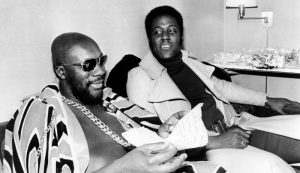Isaac Hayes – Theme From Shaft
27th December 1971 · UncategorisedThe last big hit of 1971 was one of the most enduring. A stone-cold classic, the Theme From Shaft sounds as fresh today as it did in December 1971.
Some say it was the first disco single but to me its flawless fusion of funk and soul makes it more of a precursor, while its monologues might arguably prefigure rap. And it’s highly unusual for such a big hit (No.4) in that the instrumental intro – the bit we remember best – lasts for a minute and a half, even on the shortened version released as a single.
I’ve still never seen the film, about John Shaft (“The black private dick / Who’s a sex machine / To all the chicks”) which Hayes agreed to score in return for being allowed to audition for the lead role. He never got to do that – the role went to Richard Roundtree who, like him, had no previous acting experience – but Hayes kept up his end… and won an Oscar for this theme song.
Not to get too ‘muso’ about it but the 16-note hi-hat intro is taken from perhaps the greatest soul song of all time – Otis Redding’s Try A Little Tenderness, on which Hayes played – while the legendary Charles Pitts, who more or less invented the wah-wah guitar style synonymous with funk, plays the distinctive ‘wicka-wicka’ bit. The rest of the band are Stax stars The Bar-Kays, who backed Hayes on his previous album, Hot Buttered Soul, with Hayes himself playing the synthesised keyboard.

One of the song’s most memorable quirks is the bit where Hayes, lyrically bigging up the titular Shaft’s prowess as a man, a detective and an all-round sex machine with the laydeez, starts describing him as a “bad muthaf…” before he’s shut down by one of the three backing singers (Telma Hopkins of Dawn) interrupting with “Shut yo’ mouth!” Hayes comes back with “I’m talkin’ ’bout Shaft!” and the girls respond: “We can dig it.”
In an example of the Academy’s institutional racism at the time, they tried to disqualify Hayes’s score from the Best Soundtrack nominations on the spurious grounds that he couldn’t write music, but Quincy Jones successfully intervened on his behalf.
He didn’t win that award, but made up for it with the Oscar for Best Song – this one – becoming the first writer-performer to do so, and the first African-American to do so.
